- Home
- J. T. Edson
The Fastest Gun in Texas (A Dusty Fog Civil War Book 5) Page 3
The Fastest Gun in Texas (A Dusty Fog Civil War Book 5) Read online
Page 3
‘It made a real tangle of our communications, I’ll tell you. We’d a big convoy moving to the front and they were delayed badly by having to backtrack and find another crossing. The court-martial convenes on Monday morning.’
Dusty was surprised at Dailey’s bitterness as he mentioned the court-martial and wondered at it. The young lieutenant must have expected the major commanding the ineffective guard detail to be court-martialed for his failure to prevent the destruction of the bridge. Then Dusty remembered Red’s report.
‘I thought you said you killed that major in command of the Yankees, Red.’
‘I thought so, too. I allowed to have hit him twice, second time in the head. Way he went down I figured he was dead.’
‘He is,’ Dailey put in.
‘Who’re they court-martialing then?’ asked Dusty.
‘Kirby Cogshill.’
‘Who’s he?’
‘The lieutenant who rode second-in-command of the guard detail.’
‘The lieutenant,’ snapped Dusty, face creasing in a frown. ‘How do you mean, court-martialing him. What were the charges?’
‘Dereliction of his duty, cowardice in the face of the enemy, deserting his command and failing to obey a lawful given order by a superior officer,’ answered Dailey bitterly. ‘Any one of them carrying the death penalty under the circumstances. They say he ran away from the fight at the top of the slope, left his men.’
Dusty and Red exchanged looks, hardly believing their ears. It was Dusty who spoke, his voice hard and angry.
‘That’s a damned lie. The lieutenant was just about the only one who made any attempt at the correct performing of their duties. He wanted to make a search of the woods where we were hidden and the major wouldn’t. He tried to stop the men going after Red on the other side, must have guessed what was happening. Then he came back to try and stop two of us blowing the bridge up.’
Dailey stared at Dusty, a faint glimmer of hope in his eyes. ‘I know Kirby Cogshill. He was honor cadet of our year and we were roommates at the Point. I knew he wouldn’t do any of the things they were saying about him. It’s that damned Packard, the sergeant major—he’s promoted to First Lieutenant for his part in the fight or something—and I can guess what the something is. These damned volunteer regiments are all the same, they’s not worth the—’
The words died off as Dailey realized that the Texas Light Cavalry was, to all intents and purposes, a volunteer regiment too. Dusty ignored the regular soldier’s contempt for volunteers, for he was thinking about the injustice being done to a good and brave young officer.
‘Where’s this court-martial to be held?’ he asked.
‘In the Moshogen Town court house on Monday.’
‘Monday, huh?’
‘Yes, sir,’ agreed Dailey, forgetting these two men were his enemies and that he was a prisoner. Here were two men who knew nearly everything that happened on the banks of the Moshogen River, they might be able to help his friend, prove that Kirby Cogshill was not guilty of the charges leveled against him. ‘If you ask me,’ he went on hotly, ‘this is all part of a plan to whitewash General Buller’s brother. It wouldn’t do Bully Buller’s political aspirations any good to have it known his brother was a stupid, incompetent fool, one who caused the North to lose a valuable bridge when it was needed. That’s why old Kirby’s being thrown to the wolves.’
‘That could be, mister,’ Dusty agreed, coming to his feet and walking to the door. ‘Excuse me, please.’
Dailey watched the door close behind Dusty and returned to Red with a puzzled frown. He’d been hoping to talk with Dusty to try to work out some way word could be sent to the Union Army, helping clear his friend.
‘What’s wrong?’ he asked. ‘Did I say something out of line?’
‘Something’s worrying Dusty,’ Red replied thoughtfully, he knew his cousin very well and could almost have said what Dusty was going to do. Red hoped his guess would prove wrong and Dusty would not be doing what Red suspected he was.
~*~
Dusty went down the stairs and to the front of the house. In an alcove next to the library door a white-haired master-sergeant was working on some papers. He looked up as Dusty came to the desk.
‘I’d like to see the General, Tom.’ Dusty requested.
‘He’s with Sheldon and Stuart, told me not to disturb him unless it was real important.’
‘It’s important.’
The master sergeant came to his feet and went into the library, closing the door behind him. A few moments later he came out again and held the door open. ‘Go right in, Cap’n,’ he said.
Dusty entered the room, crossed to the big table at one side and halted in a rigid brace, hand going up in a smart salute. The three men seated at the table watched him, there was a look of tolerant pleasure in the way they eyed the small young man. Ole Devil Hardin sat in the center of the group, a tall, spare, tanned man with hard black eyes. His sharp drawn, grim, fighting man’s face relaxed in a rare smile as he looked at his favorite nephew. To Hardin’s right, stocky, black-bearded and hard looking was General Bushrod Sheldon. To the left lean, spare, younger and handsome, with a cavalryman’s look about him even while he sat on a chair, was General J. E. B. Stuart. Dusty felt a touch of pride in the way these three men showed approval when they looked at him.
Dropping his eyes to Dusty’s skirtless tunic, General Sheldon gave a snort. ‘I see you’ve gone for Mark Counter’s dress style.’
Dusty allowed a smile to flicker on his face. He did not, as yet, know Mark Counter, except by repute. Mark Counter was a lieutenant in Sheldon’s regiment, the son of a rich Big Bend rancher. Being something of a dandy dresser Mark brought his own style of uniform into the Cavalry, the skirtless tunic being one of his innovations. It was a style of uniform Dusty, for all his strict ways, adopted as being a useful idea.
‘With the General’s permission, I claim it’s the best dress for a mounted, fighting soldier,’ answered Dusty politely.
Jeb Stuart chuckled and Sheldon snorted like a walrus. The new style of uniform was a cause of much controversy among the Confederate Army brass, although little was done officially to either approve or condemn it.
Ole Devil Hardin watched Dusty, knowing something important was bothering the youngster and waited to hear why Dusty came in to interrupt an important conference. Before he could speak Ole Devil was given another interruption. The door at the other end of the room opened and a small, smiling Oriental man entered, carrying a tray with glasses and a bottle of bourbon. The man, Ole Devil’s personal servant, was Tommy Okasi, thought to be Chinese, but actually Japanese, came to the United States by clipper ship to avoid some trouble in his own land. Ole Devil found him in New Orleans and took him on, gaining a loyal friend and a faithful servant. Tommy settled in the Rio Hondo country of Texas and of all the numerous Hardin, Blaze and Fog children Dusty was his favorite boy. To Dusty, smallest of them all, Tommy Okasi taught certain fighting tricks which more than offset his lack of inches and gave him a terrific advantage over much bigger and stronger men.
‘What can we do for you, Dustine?’ Ole Devil asked.
Dusty explained and had the pleasure of seeing three men, who were noted among the hard gambling Southern gentlemen as poker players, show a lot more surprise than was usual. At the end of his request Ole Devil barked:
‘That’s out of the question. You can’t put yourself into the Yankee Army’s hands. Certainly not!’
‘Devil’s right!’ Sheldon growled. ‘Let ’em shoot that fool shave-tail, save us the trouble of doing it.’
‘He’s innocent, sir,’ objected Dusty. ‘A promising young officer’s name and honor’s being dragged in the mud to help clear the name of a stupid, incompetent fool—’
‘Not the first time it’s happened, and likely won’t be the last,’ answered Sheldon. ‘Let him take his chance.’
Jeb Stuart smiled, watched the faces of the other men. He was the youngest of the trio of Generals and could guess w
hat was making Dusty act in such a manner. So could Sheldon and Hardin, but they were older and looked on life a bit more seriously. Stuart did not say anything, just sat back and watched the others, reserving his opinion until later.
‘It’s without precedent!’ Sheldon snapped. ‘An officer going to give evidence at the court-martial of an enemy.’
‘It is, sir,’ agreed Dusty, ‘but every precedent was without precedent the first time it was done and formed the precedent.’ The three Generals sat back and exchanged glances. The chivalry of war was not yet debased and dead and a Southern gentleman was that, a gentleman with everything the words implied. They were bound by a code of honor as hard and firm as any other chivalrous code in the world. They all knew what a court-martial on such charges would mean to a career officer. Even if the death penalty was not given it would break young Cogshill and ruin him. Yet, for all of that, it would be a risky thing to allow a valuable man like Dusty to go into the Union Army hands. There were men in the Union Army, the new set of officers, who would not object to this chance of taking one of the South’s three top raiders prisoner, even if he had come to give evidence at a court-martial.
‘I suppose you’ve made up your mind to go through with it, Captain?’ Sheldon asked. ‘Even without permission.’
‘If necessary, sir. Even without permission.’
Once more there was that exchange of glances and half-hidden smiles. They all knew Dusty meant every word he said. He would go to the Moshogen courthouse to give evidence before the court-martial and chance his luck and skill to escape after doing so. The only way to prevent him would be to slap him under guard and they knew his troop would not stand for that. They might just as well give in and let him go, helping him all they could.
‘I suppose you know how you’ll do it?’ Hardin made a statement of the words rather than a question. He knew Dusty was not blindly charging into something without knowing how it could be handled with the fewest risks.
‘Yes, sir. We can send the prisoner, Mr. Dailey, back with a message. I think he’ll give us his parole not to fight against the Confederacy until an exchange has been made. He can deliver my message to the Court and make arrangements for a reply to be brought.’
‘Damn it to hell!’ Sheldon bellowed, annoyed at the casual way Dusty was taking all this. ‘You can’t trust Yankees, they can’t even trust each other. Look at how they treated Bosanquet over that Quaker wagon massacre.’
Dusty did not reply to this, although he knew the story. A Union Army officer, Major Kliddoe, wiped out a small wagon train of Quakers, then laid the blame on his commanding officer, Colonel Bosanquet, who was broken for it. Dusty knew Kliddoe to be the same kind of man as the South’s William Clarke Quantrill, a murdering plunderer who used his side’s flag as an excuse for looting and outrage. They were neither of them typical of the other men who fought for both sides.
‘I think we could trust Grant, Sherman or Sheridan and take their word on this matter, sir,’ Dusty drawled. ‘They’re regular officers and would want to help clear another regular’s name.’ Sheldon was also a regular officer and knew the close bonds which linked one professional soldier to the others. When one found himself in trouble the others would do everything possible to help him out of it.
‘There’s that to it,’ he grudgingly conceded. ‘Cogshill? Would that be Will Cogshill’s boy Kirby?’
‘That was the name Mr. Dailey gave me, sir.’
‘Will and I served together in the Mexican War. Good soldier. I was his best man,’ Sheldon said grimly. ‘Young Kirby was a good boy at the Point, made best cadet of his year, I heard. Hear Will’s commanding the Third Cavalry over to Moshogen—’ He stopped as a thought hit him. ‘Hell fire, that means Will’s going to have to lay on the court-martial for young Kirby—for his own son, on those charges.’
‘It looks bad,’ Stuart spoke up. ‘We’ll help you, Dusty.’
‘Thank you, sir. I never doubted it.’
‘It doesn’t mean we don’t think you’re a damned, hotheaded young fool for doing it,’ barked Sheldon.
‘Know something, sir,’ Dusty answered with a frank, open smile. ‘So do I.’
‘Will Mosby object to you releasing his prisoner?’ Hardin inquired.
‘I doubt it, sir. Not when he knows the full circumstances. He’d do the same thing himself,’ answered Dusty. ‘Besides—’
‘Yes?’
‘I can always catch him a young Yankee shave-tail in exchange—after I get back from Moshogen.’
~*~
Dusty returned to Red’s room and found it empty, so made his way to the Mess hall and found his cousin, along with the other junior officers of the regiment, entertaining Dailey. The young men who led the troops of the Texas Light Cavalry greeted Dusty rowdily, for a boisterous party was in full swing. Dusty waved aside offers of a drink and went to Dailey.
‘I’d like to see you in my room, Mr. Dailey.’
‘Certainly, sir,’ Dailey replied and apologized to the others for leaving the party. He and Red followed Dusty from the room and through to the rear, where the officers were quartered. Dusty’s room was not much larger or better furnished than Red’s quarters and Dusty waved Dailey into a chair. Dusty sat at the table and took up a pen, pulled a sheet of paper towards him, while the other two waited for him to say why he brought them from a party.
‘I understand you’re a good friend of Mr. Cogshill?’
‘A very good friend, sir. We were roommates at West Point and hoped to serve together in his father’s regiment, but Kirby was placed in the Volunteers.’
‘You’d be pleased to help him, then?’
‘Of course,’ Dailey replied. It went without saying he would be willing to do anything he could to help a friend in time of need. He could not see how he was in any position to help Kirby Cogshill, not as a prisoner headed for Andersonville.
Dailey watched Dusty’s face not able to guess what the questions were leading up to. He could hardly understand Dusty’s interest in Cogshill’s welfare and had no inkling of what Dusty was thinking. The small Texan was not the sort to torment a prisoner with false hopes, that Dailey was sure of. There was more to the questions than first met the eye. The young officer almost guessed what lay behind the questions, but he shrugged off the idea as too fantastic for words. No man would go to such lengths to help an enemy.
That was where Dailey made his mistake. There was one man who not only would go to such lengths but was already making plans to do it.
‘I’ll give you a chance to help Mr. Cogshill,’ Dusty went on, watching the other’s face all the time. ‘I’ll have a letter for you to deliver to the President of the court-martial. In return you’ll be expected to sign a cartel and give your assurance that you won’t fight against the Army of the Confederacy until such time as an exchange of prisoners is arranged and carried out. Do I have your word?’
Dailey stared at Dusty without speaking for a long moment. He could not think straight, his mind appeared to have become clogged and jumbled. There was only one reply he could give to the generous offer.
‘You have my word, sir. I’ll sign anything.’
Dusty Fog was no fool. He knew the risks he was running and was not unduly worried by them. The thought that this might be a plot arranged by some over-bright Union Army man also occurred to him, although he doubted it. He’d watched Dailey’s face carefully, trying to see some expression that would warn him. There’d been no sign, no flickering, furtive, hint of triumph which might serve as warning to Dusty, nothing but interest. It was too much to believe this might be a clever plan to trap Dusty, there was too much against it. The young lieutenant could not have known he would be captured or the Union Army would have made sure he didn’t also let the Confederates get good arms and horses. Even had it all been a plot they could not have known Dailey would be delivered to the Texas Light Cavalry. Mosby usually handed his prisoners over to the nearest formal Confederate regiment, but there was no way the Yankee
s could know Dailey would be brought to the Texas Light Cavalry.
With this in mind Dusty started to write.
‘Come and see General Hardin, Mr. Dailey,’ he suggested as he finished his letter to the President of the court-martial. ‘All being well we should be able to send you back to the Union Army at dawn tomorrow. I’ll want you to go as escort for Mr. Dailey, Red. Take Kiowa and six men with you. Warn them off for it, ready. Mr. Dailey, you’ll be travelling under flag of truce. You can go back to the Mess now, I’ll send for you when we’ve done, Red.’
Red Blaze did not argue. He followed a rule of never going nearer to his Uncle Devil than was necessary, that way he hoped to avoid attracting any unpleasant military attentions.
Dusty and Dailey went towards the library and now there was no thought of escape in the prisoner’s mind. Two men were working on some papers at the desk now, the master sergeant and Dusty’s father. Hondo Fog straightened up, a tall, wide shouldered man wearing a Major’s uniform and with a pipe clenched between his teeth. He looked his eldest son over with a grin playing on his lips. Removing the pipe he pointed the stem at Dusty.
‘You always could stir up a hornet’s nest, boy. This time you’ve done better than ever. I’ve never seen Bushrod Sheldon so riled.’
‘Sounds likely, sir,’ Dusty replied, grinning broadly. ‘He’s torn between his mistrust of the Yankees and a desire to help out an old friend.’ Then Dusty forgot Sheldon and got down to business. ‘I’ll want certified true copies of such parts of Red and my reports as cover Lieutenant Cogshill’s behavior at the bridge.’
‘Tom’s doing that right now,’ Hondo replied. ‘Here’s a copy of the letter, Mr. Dailey—isn’t it?—will be taking with him.’
Dusty accepted the letter and read it through. It was written in the stilted, formal language of military circles and asked for free, unrestricted passage of escort of himself, Billy Jack and one servant, for the purpose of giving evidence at the forthcoming court-martial. It also asked for guarantee to be given that Dusty would be allowed to return freely to the Confederate lines after concluding his business. Dusty could see the hand of Bushrod Sheldon involved in this, the General would want something really certain before he allowed Dusty to go. The letter was satisfactory and Dusty was sure it would get fast results. He passed it back to his father and asked if he could see General Hardin.

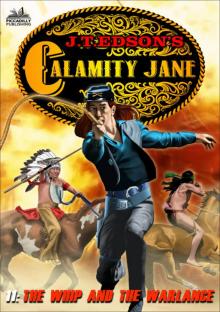 Calamity Jane 11
Calamity Jane 11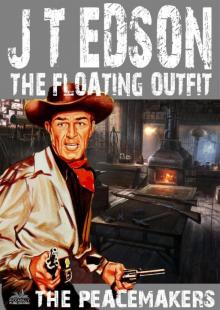 The Floating Outift 33
The Floating Outift 33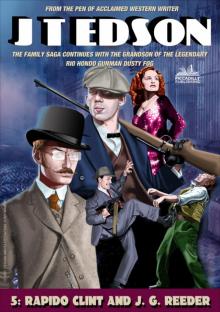 Cap Fog 5
Cap Fog 5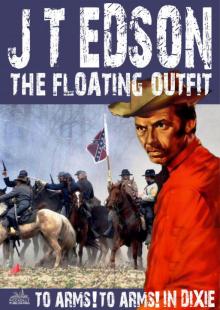 The Floating Outfit 34
The Floating Outfit 34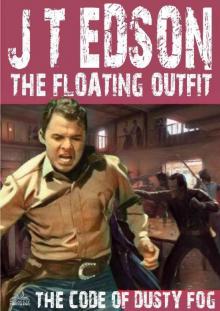 The Code of Dusty Fog
The Code of Dusty Fog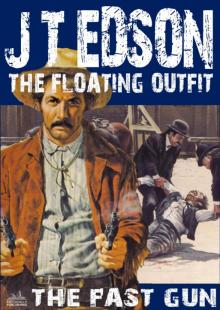 The Floating Outfit 21
The Floating Outfit 21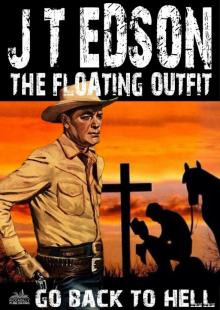 The Floating Outift 36
The Floating Outift 36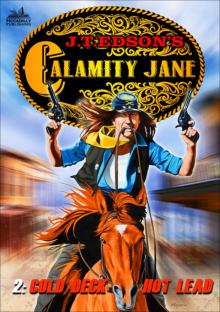 Calamity Jane 2
Calamity Jane 2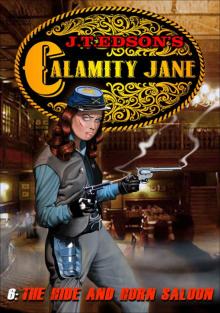 Calamity Jane 6: The Hide and Horn Saloon (A Calamity Jane Western)
Calamity Jane 6: The Hide and Horn Saloon (A Calamity Jane Western)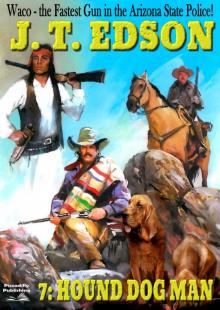 Waco 7
Waco 7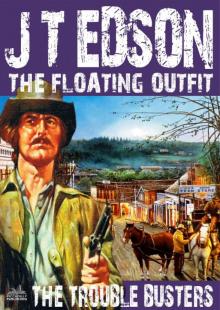 The Floating Outfit 25
The Floating Outfit 25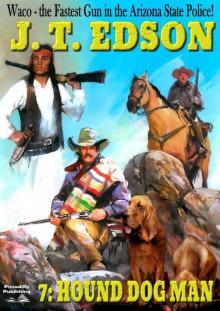 Waco 7: Hound Dog Man (A Waco Western)
Waco 7: Hound Dog Man (A Waco Western)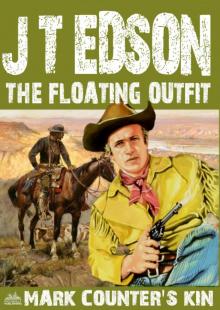 The Floating Outfit 47
The Floating Outfit 47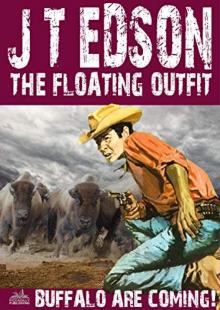 The Floating Outfit 42: Buffalo Are Coming!
The Floating Outfit 42: Buffalo Are Coming!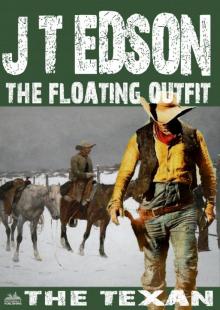 The Floating Outfit 46
The Floating Outfit 46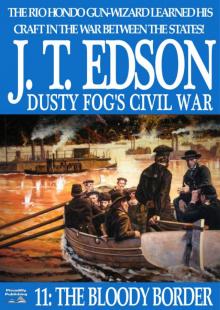 Dusty Fog's Civil War 11
Dusty Fog's Civil War 11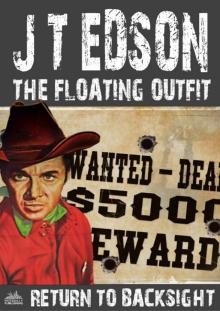 The Floating Outfit 61
The Floating Outfit 61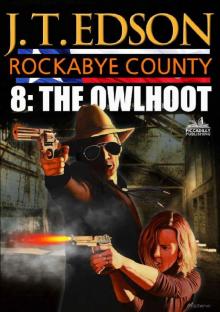 The Owlhoot
The Owlhoot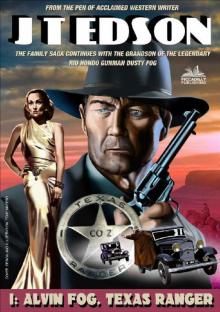 Alvin Fog, Texas Ranger
Alvin Fog, Texas Ranger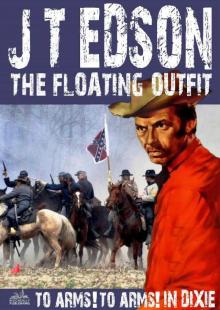 The Floating Outfit 34: To Arms! To Arms! In Dixie! (A Floating Outfit Western)
The Floating Outfit 34: To Arms! To Arms! In Dixie! (A Floating Outfit Western)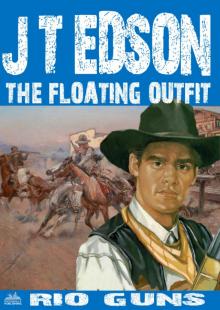 The Floating Outfit 44
The Floating Outfit 44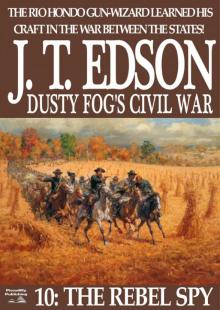 Dusty Fog's Civil War 10
Dusty Fog's Civil War 10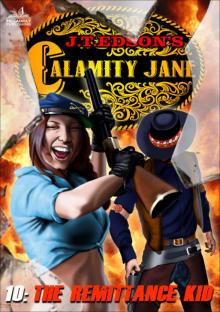 Calamity Jane 10
Calamity Jane 10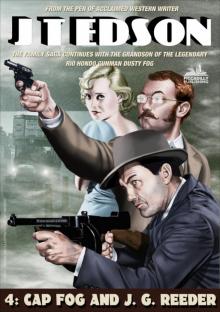 Cap Fog 4
Cap Fog 4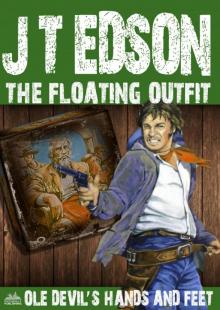 The Floating Outfit 51
The Floating Outfit 51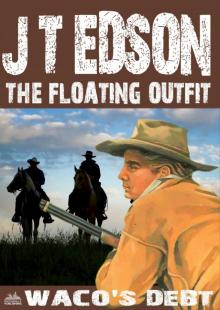 The Floating Outfit 50
The Floating Outfit 50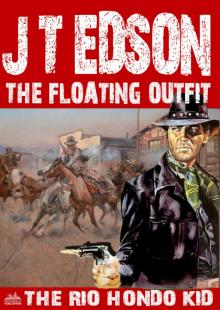 The Floating Outfit 49
The Floating Outfit 49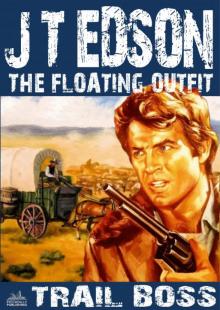 The Floating Outfit 10
The Floating Outfit 10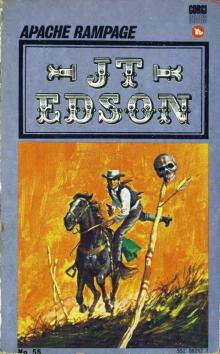 Apache Rampage
Apache Rampage The Floating Outfit 15
The Floating Outfit 15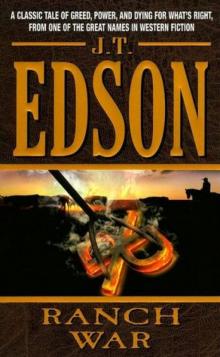 Ranch War
Ranch War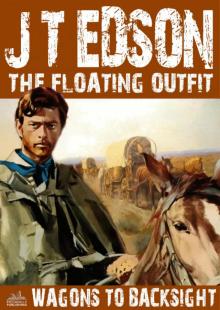 The Floating Outfit 11
The Floating Outfit 11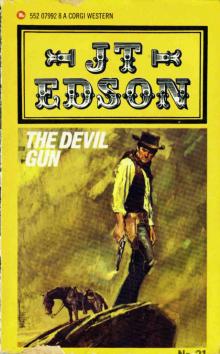 The Devil Gun
The Devil Gun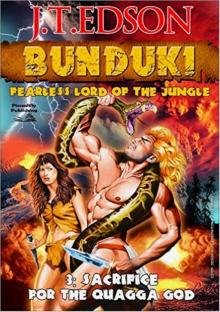 Sacrifice for the Quagga God (A Bunduki Jungle Adventure Book 3)
Sacrifice for the Quagga God (A Bunduki Jungle Adventure Book 3)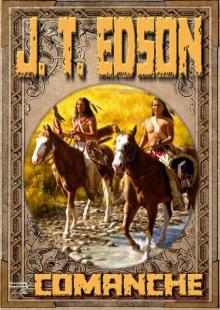 Comanche (A J.T. Edson Western Book 1)
Comanche (A J.T. Edson Western Book 1)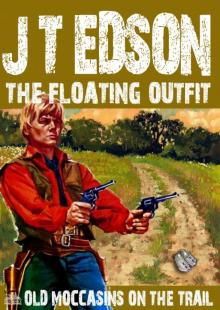 The Floating Outfit 48
The Floating Outfit 48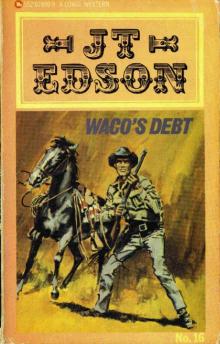 Wacos Debt
Wacos Debt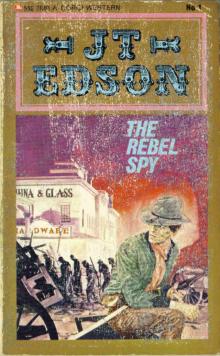 The Rebel Spy
The Rebel Spy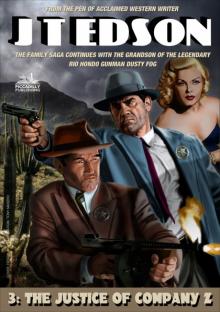 Cap Fog 3
Cap Fog 3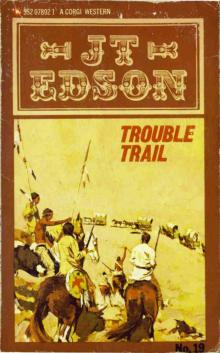 Trouble Trail
Trouble Trail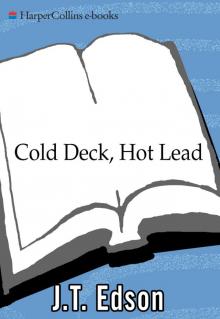 Cold Deck, Hot Lead
Cold Deck, Hot Lead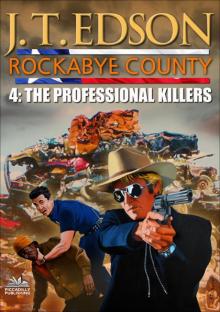 Rockabye County 4
Rockabye County 4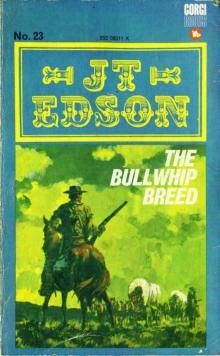 The Bullwhip Breed
The Bullwhip Breed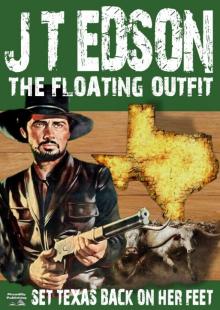 Set Texas Back On Her Feet (A Floating Outfit Western Book 6)
Set Texas Back On Her Feet (A Floating Outfit Western Book 6)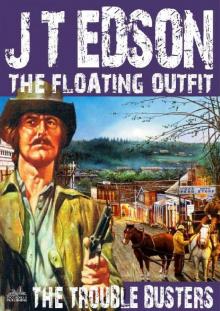 The Floating Outfit 25: The Trouble Busters (A Floating Outfit Western)
The Floating Outfit 25: The Trouble Busters (A Floating Outfit Western)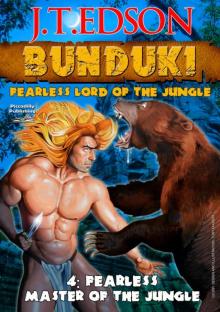 Fearless Master of the Jungle (A Bunduki Jungle Adventure
Fearless Master of the Jungle (A Bunduki Jungle Adventure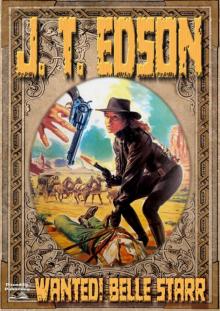 Wanted! Belle Starr!
Wanted! Belle Starr!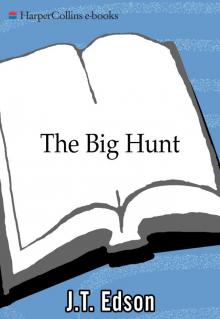 The Big Hunt
The Big Hunt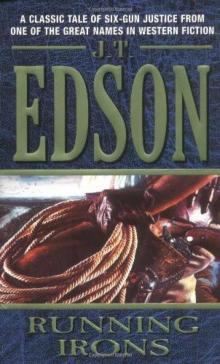 Running Irons
Running Irons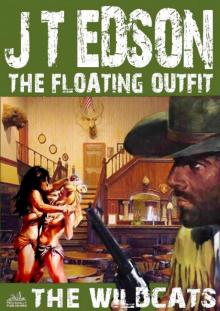 The Floating Outfit 19
The Floating Outfit 19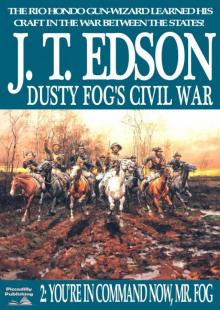 You're in Command Now, Mr Fog
You're in Command Now, Mr Fog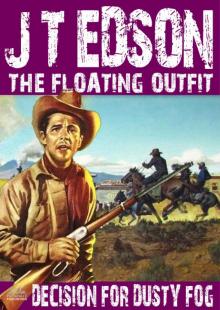 The Floating Outfit 27
The Floating Outfit 27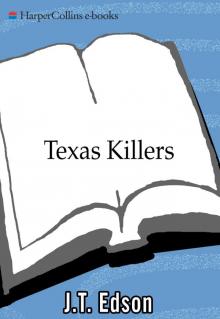 Texas Killers
Texas Killers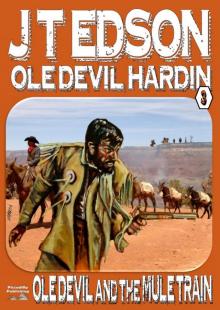 Ole Devil and the Mule Train (An Ole Devil Western Book 3)
Ole Devil and the Mule Train (An Ole Devil Western Book 3)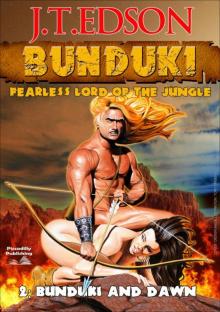 Bunduki and Dawn (A Bunduki Jungle Adventure Book 2)
Bunduki and Dawn (A Bunduki Jungle Adventure Book 2)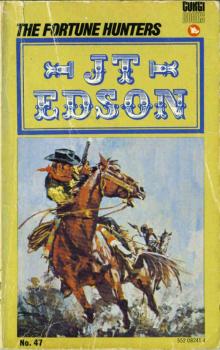 The Fortune Hunters
The Fortune Hunters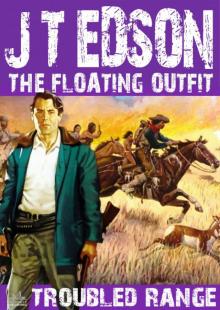 The Floating Outfit 12
The Floating Outfit 12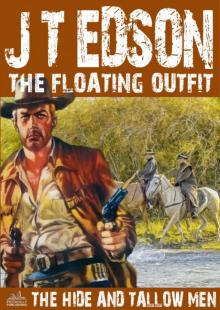 The Hide and Tallow Men (A Floating Outfit Western. Book 7)
The Hide and Tallow Men (A Floating Outfit Western. Book 7)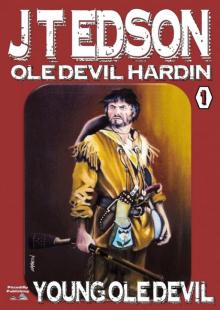 Young Ole Devil
Young Ole Devil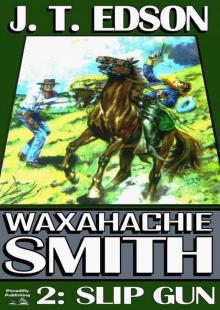 Slip Gun
Slip Gun The Drifter
The Drifter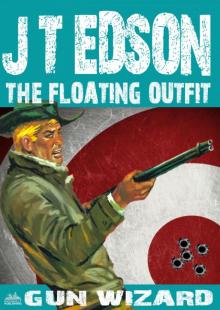 The Floating Outfit 45
The Floating Outfit 45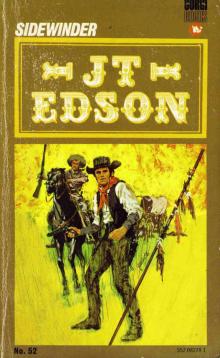 Sidewinder
Sidewinder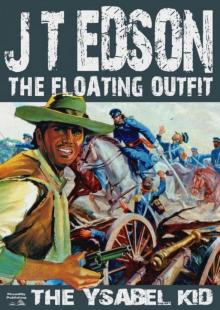 The Ysabel Kid
The Ysabel Kid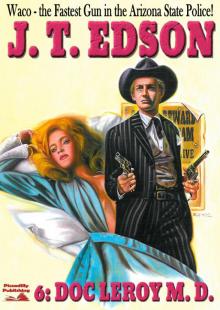 Waco 6
Waco 6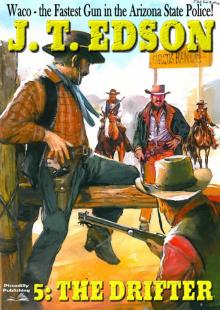 Waco 5
Waco 5 Point of Contact
Point of Contact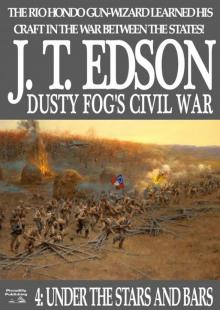 Under the Stars and Bars (A Dusty Fog Civil War Western Book 4)
Under the Stars and Bars (A Dusty Fog Civil War Western Book 4)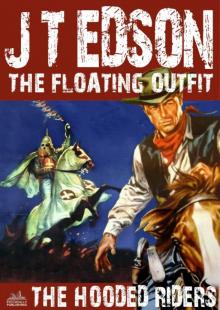 The Floating Outfit 9
The Floating Outfit 9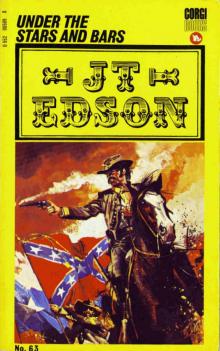 Under the Stars and Bars
Under the Stars and Bars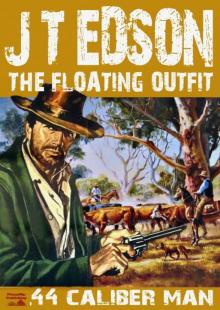 .44 Caliber Man
.44 Caliber Man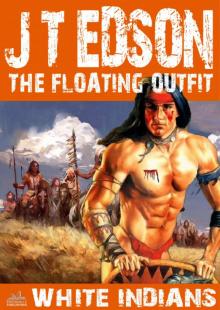 The Floating Outfit 17
The Floating Outfit 17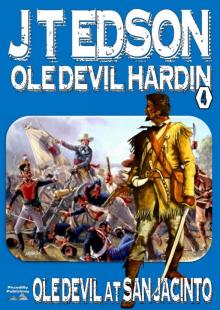 Ole Devil at San Jacinto (Old Devil Hardin Western Book 4)
Ole Devil at San Jacinto (Old Devil Hardin Western Book 4)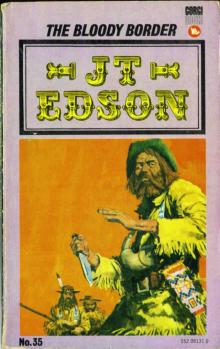 The Bloody Border
The Bloody Border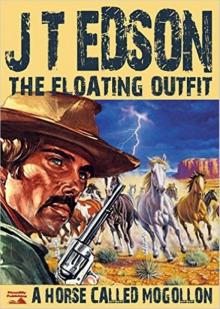 A Horse Called Mogollon (Floating Outfit Book 3)
A Horse Called Mogollon (Floating Outfit Book 3)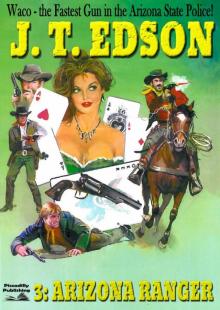 Waco 3
Waco 3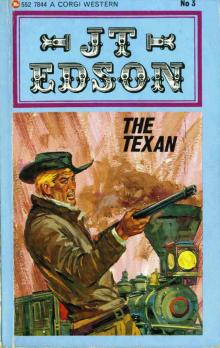 The Texan
The Texan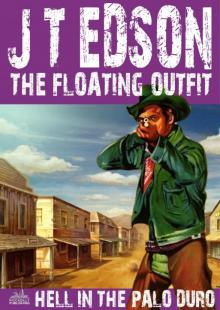 The Floating Outfit 35
The Floating Outfit 35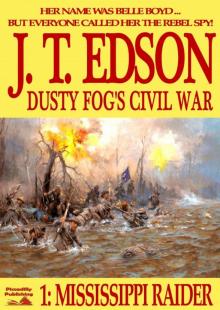 Mississippi Raider
Mississippi Raider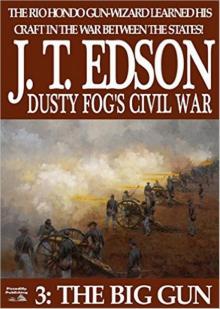 The Big Gun (Dusty Fog's Civil War Book 3)
The Big Gun (Dusty Fog's Civil War Book 3)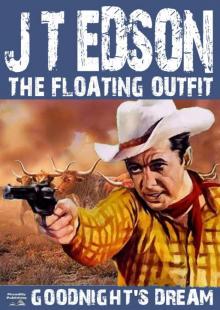 Goodnight's Dream (A Floating Outfit Western Book 4)
Goodnight's Dream (A Floating Outfit Western Book 4) Waco 4
Waco 4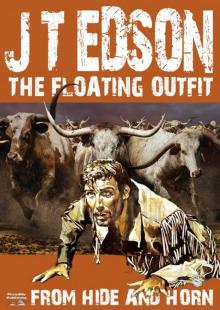 From Hide and Horn (A Floating Outfit Book Number 5)
From Hide and Horn (A Floating Outfit Book Number 5)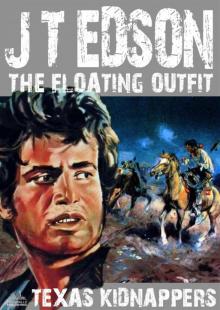 The Floating Outfit 18
The Floating Outfit 18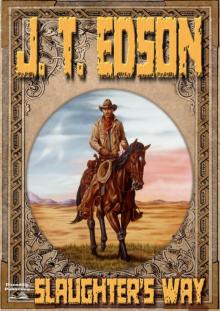 Slaughter's Way (A J.T. Edson Western)
Slaughter's Way (A J.T. Edson Western)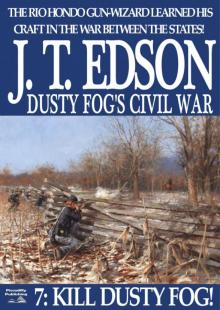 Dusty Fog's Civil War 7
Dusty Fog's Civil War 7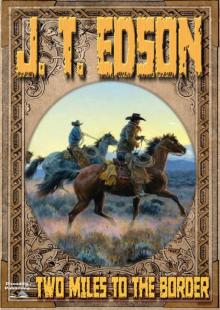 Two Miles to the Border (A J.T. Edson Western)
Two Miles to the Border (A J.T. Edson Western)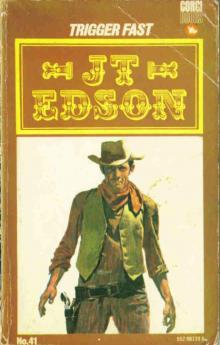 Trigger Fast
Trigger Fast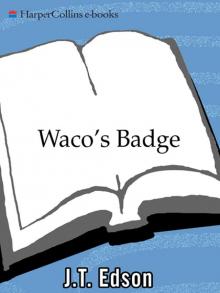 Waco's Badge
Waco's Badge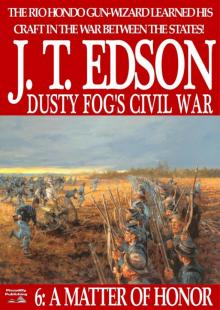 A Matter of Honor (Dusty Fog Civil War Book 6)
A Matter of Honor (Dusty Fog Civil War Book 6)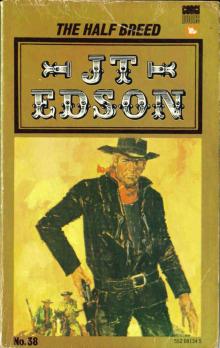 The Half Breed
The Half Breed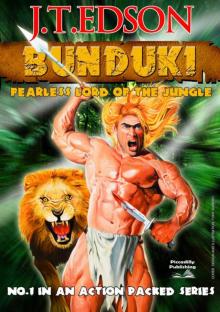 Bunduki (Bunduki Series Book One)
Bunduki (Bunduki Series Book One)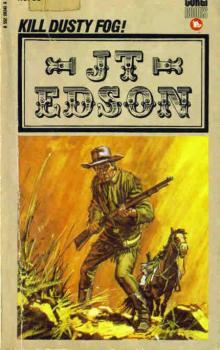 Kill Dusty Fog
Kill Dusty Fog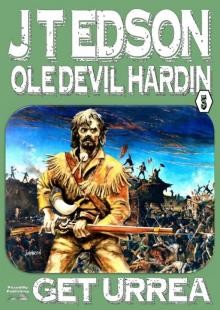 Get Urrea! (An Ole Devil Hardin Western Book 5)
Get Urrea! (An Ole Devil Hardin Western Book 5)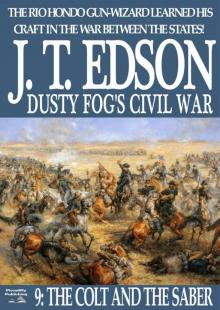 Dusty Fog's Civil War 9
Dusty Fog's Civil War 9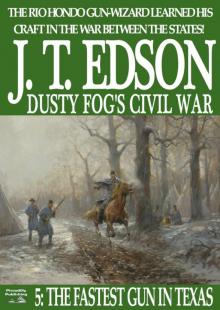 The Fastest Gun in Texas (A Dusty Fog Civil War Book 5)
The Fastest Gun in Texas (A Dusty Fog Civil War Book 5)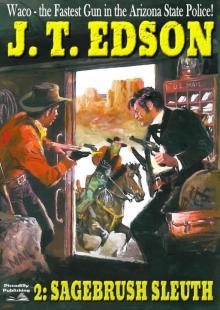 Sagebrush Sleuth (A Waco Western #2)
Sagebrush Sleuth (A Waco Western #2)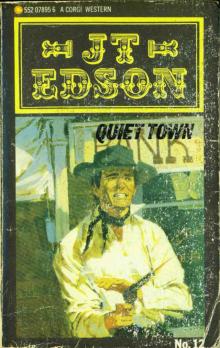 Quiet Town
Quiet Town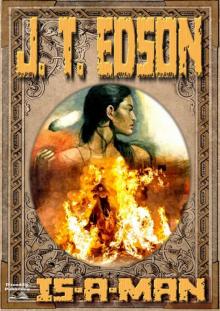 Is-A-Man (A J.T. Edson Standalone Western)
Is-A-Man (A J.T. Edson Standalone Western)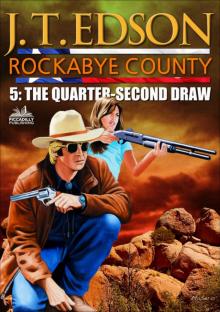 Rockabye County 5
Rockabye County 5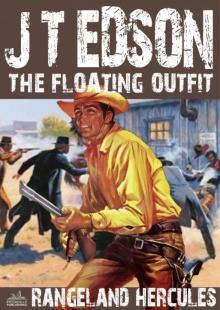 The Floating Outfit 14
The Floating Outfit 14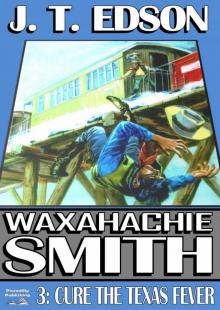 Cure the Texas Fever (A Waxahachie Smith Western--Book 3)
Cure the Texas Fever (A Waxahachie Smith Western--Book 3)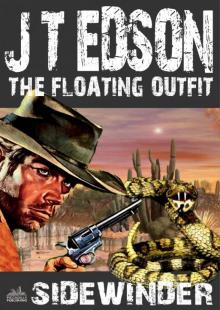 The Floating Outfit 13
The Floating Outfit 13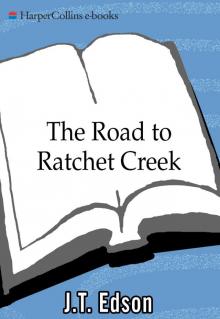 The Road to Ratchet Creek
The Road to Ratchet Creek